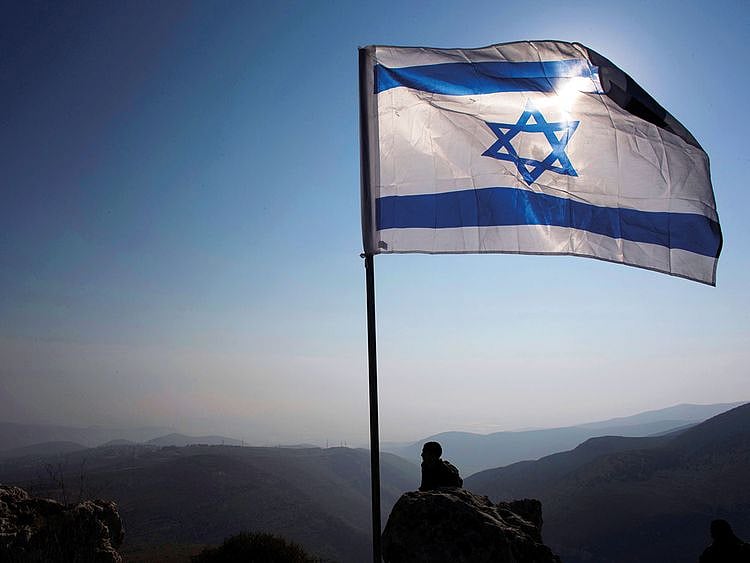Plan to annex Jordan Valley predates Netanyahu's vow
Truncated ‘Palestinian state’ would then be completely surrounded by Israel

Damascus: Israeli Prime Minister Benjamin Netanyahu’s blatant threat to annex the Jordan Valley, if elected to a fifth term, was followed by an Israeli Cabinet meeting in the Valley on September 15, with the premier saying that annexation was a “one-time historic opportunity” to redraw Israel’s borders.
The ambition is not new to Netanyahu, who has repeatedly made such a promise since he was first elected premier in 1996.
Back then, he promised to build 2,000 Israeli colonist homes in the Jordan Valley, prompting Jordan’s then King Hussain to write him a letter, saying that this was an insult to Jordan and to the entire peace process.
In his 2007 biography of Hussain, “Lion of Jordan” Israeli historian Avi Shlaim commented on Netanyahu’s audacity over the Jordan Valley, saying: “He was that very rare thing — a genuine charlatan.”
Israeli campaign dates far back
But the designs go even further back than Netanyahu.
Many Israeli politicians consider the Jordan Valley as their country’s security border.
This explains why repeated governments have peppered the valley with illegal colonies since their occupation of the West Bank back in 1967.
Five were first erected under Prime Minister Levi Eshkol, followed by six under Golda Meir, and a total of 18 during the years 1975-1999.
Outside the city of Jericho and its environs, Israel currently controls anywhere between 86-90 per cent of the west portions of the Jordan Valley.
Estimates vary but anywhere between 11,000-12,700 Israeli colonists now illegally reside in the Jordan Valley.
Meanwhile, the Jordanian military cannot enter and nor can aircraft fly over the area.
After the 1967 war, Israeli Labour Minister Yigal Allon put forth a suggestion, which was flatly rejected by King Hussain; it had called for the partition of the Jordan Valley between Israel and Jordan.
“Consecutive Israeli governments have worked on this project since 1977,” prominent Palestinian businessman and philanthropist, Munib Al Masri, told Gulf News.
“There is no difference here between the Israeli left and the Israeli right. Both want to annex this territory, all the way to south of Bissan, in a project that they call Greater Jerusalem, or Jerusalem 2050.”
The importance of the Jordan Valley
The Jordan Valley is a long and narrow strip, 105km in length and 10km in width, running from the Sea of Galilee in the north to the Dead Sea in the south.
It forms the borders between Jordan to the east and Israel and the West Bank to the west.
According to the 1994 Jordanian-Israeli peace treaty, the Jordan Valley was to serve as the “administrative boundary” between the two countries.
All colonies built inside this space are illegal under international law.
The Jordan Valley is also extremely fertile and is considered the “bread basket” of the West Bank, provided the majority of produce for its citizens.
Completely surrounded by Israel
If Netanyahu puts his words into action, he would completely isolate the Palestinians in their already truncated state, which would be now surrounded by Israel on its east and west, denying them any control of their borders.
“It will destroy whatever chances there are for a Palestinian State in the future” said Al Masri.
“Jordan realises that regardless of who wins the Israeli elections, the Greater Israel project will move on at the expense of the Palestinian right to self-determination and statehood,” added Al Sharif.
“This presents Jordan with unprecedented challenges as Israel seeks to take Palestinian lands without the people.
Fears of a slow influx of Palestinians into the kingdom are realistic; threatening the delicate demographic make-up of Jordan and therefore its political stability.”
Netanyahu says that the annexation has been okayed by the Trump Administration, which has already recognised occupied Jerusalem as the “capital” of Israel, back in December 2017, and in March, accepted Israeli sovereignty over the occupied Golan Heights, which beling to Syria.
Jordan taking threats seriously
Commenting on the his recent threats, Jordanian Foreign Minister Ayman Al Safadi tweeted: “Killing all chances for peace for electoral purposes is irresponsible, dangerous.”
“Jordan is taking it seriously,” said veteran Jordanian journalist and Gulf News columnist Osama Al Sharif. The geopolitical moment, he told Gulf News, “allows Israel’s Far Right to breach international law with impunity.”
On Tuesday, Jordan’s King Abdullah II said if Israel goes ahead with the idea of annexing all the colonies in the West Bank it would be a “disaster” for attempts to find any two-state solution with the Palestinians.
Speaking after talks with German Chancellor Angela Merkel Tuesday, Abdullah said he was “extremely concerned” about Netanyahu’s vow.
He says it will “directly impact” the relationship between Israel and Jordan, and Israel and Egypt, and that “these types of statements are... a disaster to any attempt to move forward to the two-state solution.”
Merkel agreed, calling Netanyahu’s vow “unhelpful.”
Abdullah added that “we’re looking on this with tremendous concern.”
Sign up for the Daily Briefing
Get the latest news and updates straight to your inbox
Network Links
GN StoreDownload our app
© Al Nisr Publishing LLC 2026. All rights reserved.